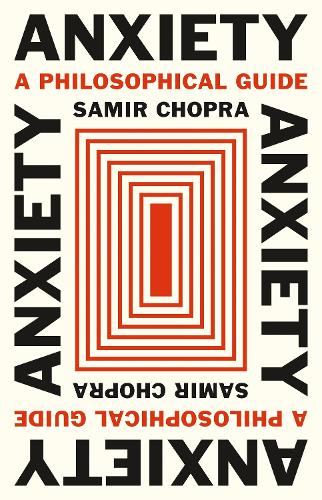
Anxiety: A Philosophical Guide
(Paperback)
Available Formats
Publishing Details
Anxiety: A Philosophical Guide
By (Author) Samir Chopra
Princeton University Press
Princeton University Press
11th February 2026
United States
Classifications
General
Non Fiction
Ethics and moral philosophy
Topics in philosophy
Psychology: emotions
152.46
Physical Properties
Paperback
208
Width 129mm, Height 198mm
Description
How philosophy can teach us to be less anxious about being anxious by understanding that it's an essential part of being human.
Today, anxiety is usually thought of as a pathology, the most diagnosed and medicated of all psychological disorders. But anxiety isn't always or only a medical condition. Indeed, many philosophers argue that anxiety is a normal, even essential, part of being human, and that coming to terms with this fact is potentially transformative, allowing us to live more meaningful lives by giving us a richer understanding of ourselves. In Anxiety, Samir Chopra explores valuable insights about anxiety offered by ancient and modern philosophies - Buddhism, existentialism, psychoanalysis, and critical theory. Blending memoir and philosophy, he also tells how serious anxiety has affected his own life - and how philosophy has helped him cope with it.
Chopra shows that many philosophers-including the Buddha, Kierkegaard, Nietzsche, Freud, and Heidegger - have viewed anxiety as an inevitable human response to existence: to be is to be anxious. Drawing on Karl Marx and Herbert Marcuse, Chopra examines how poverty and other material conditions can make anxiety worse, but he emphasizes that not even the rich can escape it. Nor can the medicated. Inseparable from the human condition, anxiety is indispensable for grasping it. Philosophy may not be able to cure anxiety but, by leading us to greater self-knowledge and self-acceptance, it may be able to make us less anxious about being anxious.
Personal, poignant, and hopeful, Anxiety is a book for anyone who is curious about rethinking anxiety and learning why it might be a source not only of suffering but of insight.
Reviews
"Readers will appreciate Chopras lucid explanations and refreshing assertion that anxiety is an inherent part of being human that doesnt necessarily need fixing. . . . This carefully considered assessment of a 'universal, perennial human condition' provides plenty of food for thought." * Publishers Weekly *
"[A] useful introduction to the work of thinkers who confront, rather than recoil from, our most fruitfully unpleasant feeling . . . Chopras book represents an urgent attempt to recover anxiety from those who threaten to medicate or counsel it out of existence. It leads by example, providing a rewarding and challenging alternative to the facile self-help that it implicitly (and sometimes explicitly) critiques."---Becca Rothfeld, Washington Post
"Chopra has composed a graceful account of the intrinsic relationship between philosophy and anxietyand how it compels us to question the very meaning of our existence. The aim of this unique book is not to calm our inner seas, but to provide tools for reinterpreting our relation to the anxiety that drives us to the clinic and the medicine cabinet. Chopra has hit the bulls eye."---Gordon Marino, LitHub
"Chopra is right to want to normalize the anxiety that people really do feel, saying that it is wrong to think that mental health consists in being anxiety-free. His basic therapeutic advicenot to push anxiety away but to see what it points to is also spot-on . . . a good primer on the major philosophers of anxiety"---Julian Baggini, Wall Street Journal
"A book of therapeutic philosophy. . . . Chopra does a great job bringing different philosophical perspectives into his conversation about anxiety."---Oscar Davis, The Conversation AU
Author Bio
Samir Chopra is a philosophical counselor and professor emeritus of philosophy at Brooklyn College and the Graduate Center of the City University of New York. He is the author and coauthor of many books, including Shyam Benegal: Philosopher and Filmmaker, A Legal Theory for Autonomous Artificial Agents, and Eye on Cricket: Reflections on the Great Game. His essays have appeared in the Nation, the Los Angeles Review of Books, Aeon, Psyche, and other publications.
